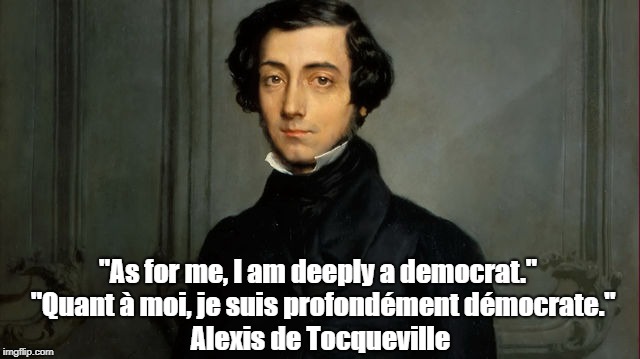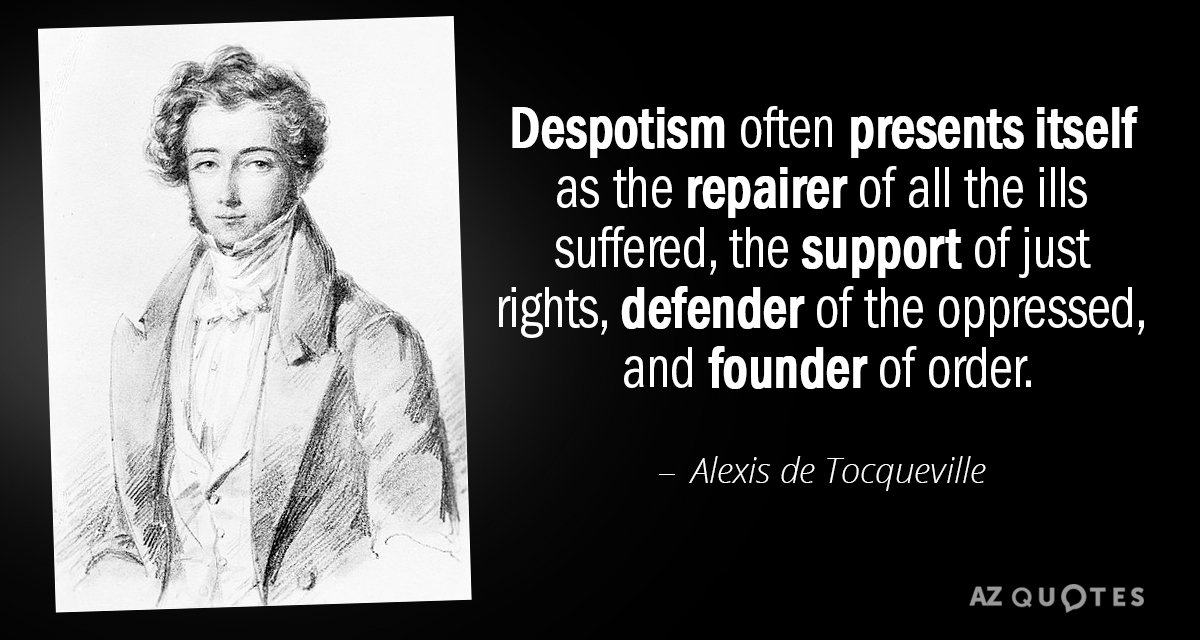"Democracy In America"
Full text online
http://xroads.virginia.edu/~hyper/DETOC/toc_indx.html
De Tocqueville On The Superiority Of Democracy:
De Tocqueville On The Superiority Of Democracy:
"... in the end it (democracy) produces more than any absolute government; if it does fewer things well, it does a greater number of things. Under its sway the grandeur is not in what the public administration does, but in what is done without it or outside of it. Democracy does not give the people the most skillful government, but it produces what the ablest governments are frequently unable to create: namely, an all-pervading and restless activity, a superabundant force, and an energy which is inseparable from it and which may, however unfavorable circumstances may be, produce wonders. These are the true advantages of democracy.
In the present age, when the destinies of Christendom seem to be in suspense, some hasten to assail democracy as a hostile power while it is yet growing; and others already adore this new deity which is springing forth from chaos. But both parties are imperfectly acquainted with the object of their hatred or their worship; they strike in the dark and distribute their blows at random.
We must first understand what is wanted of society and its government. Do you wish to give a certain elevation to the human mind and teach it to regard the things of this world with generous feelings, to inspire men with a scorn of mere temporal advantages, to form and nourish strong convictions and keep alive the spirit of honorable devotedness? Is it your object to refine the habits, embellish the manners, and cultivate the arts, to promote the love of poetry, beauty, and glory? Would you constitute a people fitted to act powerfully upon all other nations, and prepared for those high enterprises which, whatever be their results, will leave a name forever famous in history? If you believe such to be the principal object of society, avoid the government of the democracy, for it would not lead you with certainty to the goal.
But if you hold it expedient to divert the moral and intellectual activity of man to the production of comfort and the promotion of general well-being; if a clear understanding be more profitable to man than genius; if your object is not to stimulate the virtues of heroism, but the habits of peace; if you had rather witness vices than crimes, and are content to meet with fewer noble deeds, provided offenses be diminished in the same proportion; if, instead of living in the midst of a brilliant society, you are contented to have prosperity around you; if, in short, you are of the opinion that the principal object of a government is not to confer the greatest possible power and glory upon the body of the nation, but to ensure the greatest enjoyment and to avoid the most misery to each of the individuals who compose it--if such be your desire, then equalize the conditions of men and establish democratic institutions.
But if the time is past at which such a choice was possible, and if some power superior to that of man already hurries us, without consulting our wishes, towards one or the other of these two governments, let us endeavor to make the best of that which is allotted to us and, by finding out both its good and its evil tendencies, he able to foster the former and repress the latter to the utmost.
Alexis De Tocqueville On Liberty, Morality And Faith
http://paxonbothhouses.blogspot.com/2018/01/alexis-de-tocqueville-on-liberty.html
Alexis de Toqueville issued prophetic warnings in "Democracy in America":
I think then that the species of oppression by which democratic nations are menaced is unlike anything which ever before existed in the world: our contemporaries will find no prototype of it in their memories. I am trying myself to choose an expression which will accurately convey the whole of the idea I have formed of it, but in vain; the old words “despotism” and “tyranny” are inappropriate: the thing itself is new; and since I cannot name it, I must attempt to define it.
I seek to trace the novel features under which despotism may appear in the world. The first thing that strikes the observation is an innumerable multitude of men all equal and alike, incessantly endeavoring to procure the petty and paltry pleasures with which they glut their lives. Each of them, living apart, is as a stranger to the fate of all the rest—his children and his private friends constitute to him the whole of mankind; as for the rest of his fellow-citizens, he is close to them, but he sees them not—he touches them, but he feels them not; he exists but in himself and for himself alone; and if his kindred still remain to him, he may be said at any rate to have lost his country.
Above this race of men stands an immense and tutelary power, which takes upon itself alone to secure their gratifications, and to watch over their fate. That power is absolute, minute, regular, provident, and mild. It would be like the authority of a parent, if, like that authority, its object was to prepare men for manhood; but it seeks on the contrary to keep them in perpetual childhood: it is well content that the people should rejoice, provided they think of nothing but rejoicing. For their happiness such a government willingly labors, but it chooses to be the sole agent and the only arbiter of that happiness: it provides for their security, foresees and supplies their necessities, facilitates their pleasures, manages their principal concerns, directs their industry, regulates the descent of property, and subdivides their inheritances—what remains, but to spare them all the care of thinking and all the trouble of living?
***
"Americans cleave to the things of this world as if assured that they will never die,… They clutch everything but hold nothing fast, and so lose grip as they hurry after some new delight. An American will build a house in which to pass his old age and sell it before the roof is on; he will plant a garden and rent it just as the trees are coming into bearing; he will clear a field and leave others to reap the harvest; he will take up a profession and leave it, settle in one place and soon go off elsewhere with his changing desires. If his private business allows him a moment’s relaxation, he will plunge at once into the whirlpool of politics. Then, if at the end of a year crammed with work he has a little spare leisure, his restless curiosity goes with him traveling up and down the vast territories of the United States. Thus he will travel five hundred miles in a few days as a distraction from his happiness. Death steps in in the end and stops him before he has grown tired of this futile pursuit of that complete felicity which always escapes him. At first sight there is something astonishing in this spectacle of so many lucky men restless in the midst of abundance. But it is a spectacle as old as the world; all that is new is to see a whole people performing in it.- Book Two, Chapter XIII. Democracy In America, Volume 2

There is in fact a manly and legitimate passion for equality that spurs all men to wish to be strong and esteemed. This passion tends to elevate the lesser to the rank of the greater. But one also finds in the human heart a depraved taste for equality, which impels the weak to want to bring the strong down to their level, and which reduces men to preferring equality in servitude to inequality in freedom.


- Chapter III, Part I Democracy In America Volume 1

Alan: I have been unable to determine the attribution of the above quotation but the sentiment is attractive and comports with the preceding quote.
Democracy, Isolation, Association, Aspiration, Acquisition and Freedom Of The Press
Democracy In America, Volume 2, Book Two
- I think that democratic communities have a natural taste for freedom: left to themselves, they will seek it, cherish it, and view any privation of it with regret. But for equality, their passion is ardent, insatiable, incessant, invincible: they call for equality in freedom; and if they cannot obtain that, they still call for equality in slavery.
- Book Two, Chapter I.
- Not only does democracy make every man forget his ancestors, but also clouds their view of their descendants and isolates them from their contemporaries. Each man is for ever thrown back on himself alone, and there is danger that he may be shut up in the solitude of his own heart.
- Book Two, Chapter II.
- Americans of all ages, all stations of life, and all types of disposition are forever forming associations... In democratic countries knowledge of how to combine is the mother of all other forms of knowledge; on its progress depends that of all the others.
- Book Two, Chapter V.
- Americans combine to give fêtes, found seminaries, build churches, distribute books, and send missionaries to the antipodes. Hospitals, prisons, and schools take shape in that way. Finally, if they want to proclaim a truth or propagate some feeling by the encouragement of a great example, they form an association. In every case, at the head of any new undertaking, where in France you would find the government or in England some territorial magnate, in the United States you are sure to find an association. I have come across several types of association in America of which, I confess, I had not previously the slightest conception, and I have often admired the extreme skill they show in proposing a common object for the exertions of very many and in inducing them voluntarily to pursue it.
- Book Two, Chapter V.
- I am far from denying that newspapers in democratic countries lead citizens to do very ill-considered things in common; but without newspapers there would be hardly any common action at all. So they mend many more ills than they cause.
- Book Two, Chapter VI.
- Americans cleave to the things of this world as if assured that they will never die,… They clutch everything but hold nothing fast, and so lose grip as they hurry after some new delight. An American will build a house in which to pass his old age and sell it before the roof is on; he will plant a garden and rent it just as the trees are coming into bearing; he will clear a field and leave others to reap the harvest; he will take up a profession and leave it, settle in one place and soon go off elsewhere with his changing desires. If his private business allows him a moment’s relaxation, he will plunge at once into the whirlpool of politics. Then, if at the end of a year crammed with work he has a little spare leisure, his restless curiosity goes with him traveling up and down the vast territories of the United States. Thus he will travel five hundred miles in a few days as a distraction from his happiness. Death steps in in the end and stops him before he has grown tired of this futile pursuit of that complete felicity which always escapes him. At first sight there is something astonishing in this spectacle of so many lucky men restless in the midst of abundance. But it is a spectacle as old as the world; all that is new is to see a whole people performing in it.
- Book Two, Chapter XIII.
- The First thing that strikes a traveler in the United States is the innumerable multitude of those who seek to emerge from their original condition; and the second is the rarity of lofty ambition to be observed in the midst of the universally ambitious stir of society. No Americans are devoid of a yearning desire to rise, but hardly any appear to entertain hopes of great magnitude or to pursue very lofty aims. All are constantly seeking to acquire property, power, and reputation.
- Book Three, Chapter XIX.
- What chiefly diverts the men of democracies from lofty ambition is not the scantiness of their fortunes, but the vehemence of the exertions they daily make to improve them.
- Book Three, Chapter XIX.
- What most astonishes me in the United States, is not so much the marvelous grandeur of some undertakings, as the innumerable multitude of small ones.
- Book Two, Chapter XIX.
- The territorial aristocracy of former ages was either bound by law, or thought itself bound by usage, to come to the relief of its serving-men and to relieve their distresses. But the manufacturing aristocracy of our age first impoverishes and debases the men who serve it and then abandons them to be supported by the charity of the public.
- Book Two, Chapter XX.


No comments:
Post a Comment